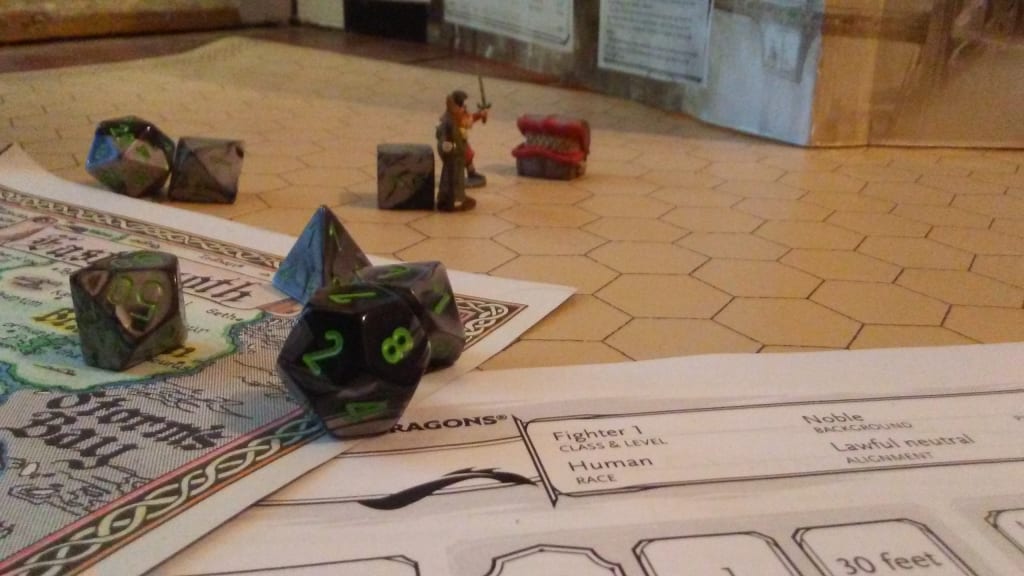Being a Dungeon Master, Part 1
Three Things Every Game Master Must Do

1. Know the material.
A surprising number of novice DMs have not actually read the Dungeon Masters Guide. That's because they don't have to, the link above will provide everything needed to become a dungeon master and run that first session.
I still recommend reading the entire Player's Handbook, the Dungeon Master's Guide and the introduction to the Monster Manual. This is the part where my advice to beginning players takes a sharp turn. I don't suggest new players try to read the rules and absorb them, but DMs, on the other hand, have to know the rules to make good calls and keep the game flowing.
Read some source material about the setting. If the game is set in Greyhawk, do some homework on Greyhawk. One doesn't need to become an expert, but knowledge of the source material adds flavor to his or her game and helps inspire and expedite design.
A Game Master is a Judge, a Referee and a Coach.

2. Be a good judge.
In court a judge is honored because they must hear all that is said (and infer what is not), keep proceedings moving, and render a fair verdict. The judge does this by knowing a hell of a lot about the legal system. It is an honor to be a judge but also a huge burden.
Let's take this analogy from the courtroom to the basketball court. Imagine there is a basketball game but the "referees" are all umpires. The game would be nonsense; full of bad calls and no fun at all. This is why a good DM must know the material. As most judges are lawyers, a referee may have started out as a coach. A coach teaches the players how to play, helps them improve, and offers guidance when prudent. A good coach puts the players first, like a good DM. Three commandments that I strictly follow are as follows: be open-minded, be fair, be fun.
Being open-minded means putting away an ego letting players play. If players have a rules gripe, discuss it after the session so it doesn’t eat up table time. If a call was deemed poor in hindsight, correct the issue at the next session and toss the player(s) some inspiration points.
Being fair is a given, consistently treat each player with respect and avoid favoritism. Avoid rulings or actions on the DM's part that nullify a player's choice. This includes railroading players into situations or changing anything on a player's sheet. Game effects that switch genders or change race or alignment are incredibly invasive. Temporarily increasing or reducing stats aside, if a DM is writing on character sheets they are making a rookie mistake.
Being fun means knowing when to bend or break rules to tell a good story. If the players have a great idea and the energy is high, nothing kills the mood like a bad die roll or a bad ruling. Go with it, the players who know what the DM is up to are unlikely to call him or her out on it.
3. Study your ass off.
A lot of novice DMs think that because they spent hours working on their game, it will be awesome. A well written, engaging setting or adventure has more to do with being a hard thinker and less to do with being a hard worker. The most productive person is the person who has discipline. Reading for me is essential because tabletop RPGs are still a written medium.
I don't just read fantasy or RPG stuff, I read all kinds of books, I try to finish a novel each month. I read what interests me and if I'm reading and I lose interest, I quit and start another book. I would suggest reading with a pencil and notebook nearby so when inspiration hits, it can be written down.
I also keep a log of what I've read, tracking other works by that author, things that author reads, and other helpful tidbits. I don't always read everyday but everyday I do something RPG related. Maybe I write, or paint a mini, or watch a session on twitch, but I still work at something everyday. Some truly uninspired days I just write in my journal, but I'm trying to learn something everyday. Learning any craft will take time and study. It will also require learning how to accept failure, rejection and criticism.
About the Creator
Jeromy Schulz-Arnold
Jeromy Schulz-Arnold is a freelance writer. He has a day job but he spends an irresponsible amount of time daydreaming...






Comments
There are no comments for this story
Be the first to respond and start the conversation.